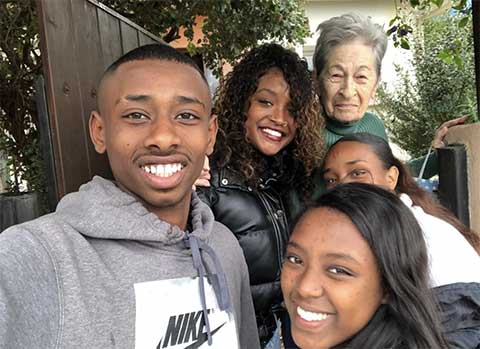
For the last year and a half, Esther Mikonen and Rachel Mengisto, teenagers from Hadassah’s Meir Shfeya Youth Village, have brought food before Shabbat to Holocaust survivors in nearby neighborhoods.
“We teens have developed very warm friendships with them,” they explain. “Every visit brought us closer. Especially now that we're out of school and at home, we make sure to be in touch with them by phone all the time. They are happy to get our calls. We talk about our own feelings, and they talk about theirs. We ask them if they need anything, since they can't go shopping now. We ask them if anyone is available to help them.
“We heard on the news that it's important to be in touch with the elderly population at this time, when they're not supposed to leave the house. We'd like to do more, to visit, but we know that we might be coronavirus carriers and can endanger them. They're in the high-risk population.
“But do you know what? In some ways, they're stronger than we are. They have been through such difficult times in their history that, in the end, they strengthen us, reducing our worries and fears. We recommend that everyone think about the older people in their lives and call them.”
Hadassah Neurim Village Director Ami Magen reports that there are now 73 students still living at the village. Maintaining their bonds with those who have returned to their homes, the Youth Aliyah staff, she says, “are in touch constantly, providing assignments, helping with schoolwork and personal problems, and, when necessary, conducting therapy via Zoom. We are also sending food packages home as Pesach approaches, because many homes are short on resources.”
Hadassah’s Israel Director of Public Relations Barbara Sofer relates that most of the parents of the Youth Aliyah children and teens have been dismissed from their jobs. “These are not families where there are reserves of money or even food,” she explains. “Now their teenagers are home, too. The kids are in distress and turning to the villages for help.”
She adds, “Remember who goes to live in a Youth Aliyah village—kids from immigrant and at-risk homes, kids who need the special care and educational support of a youth village. Imagine the extra pressure they are experiencing, confined to their small apartments.”








